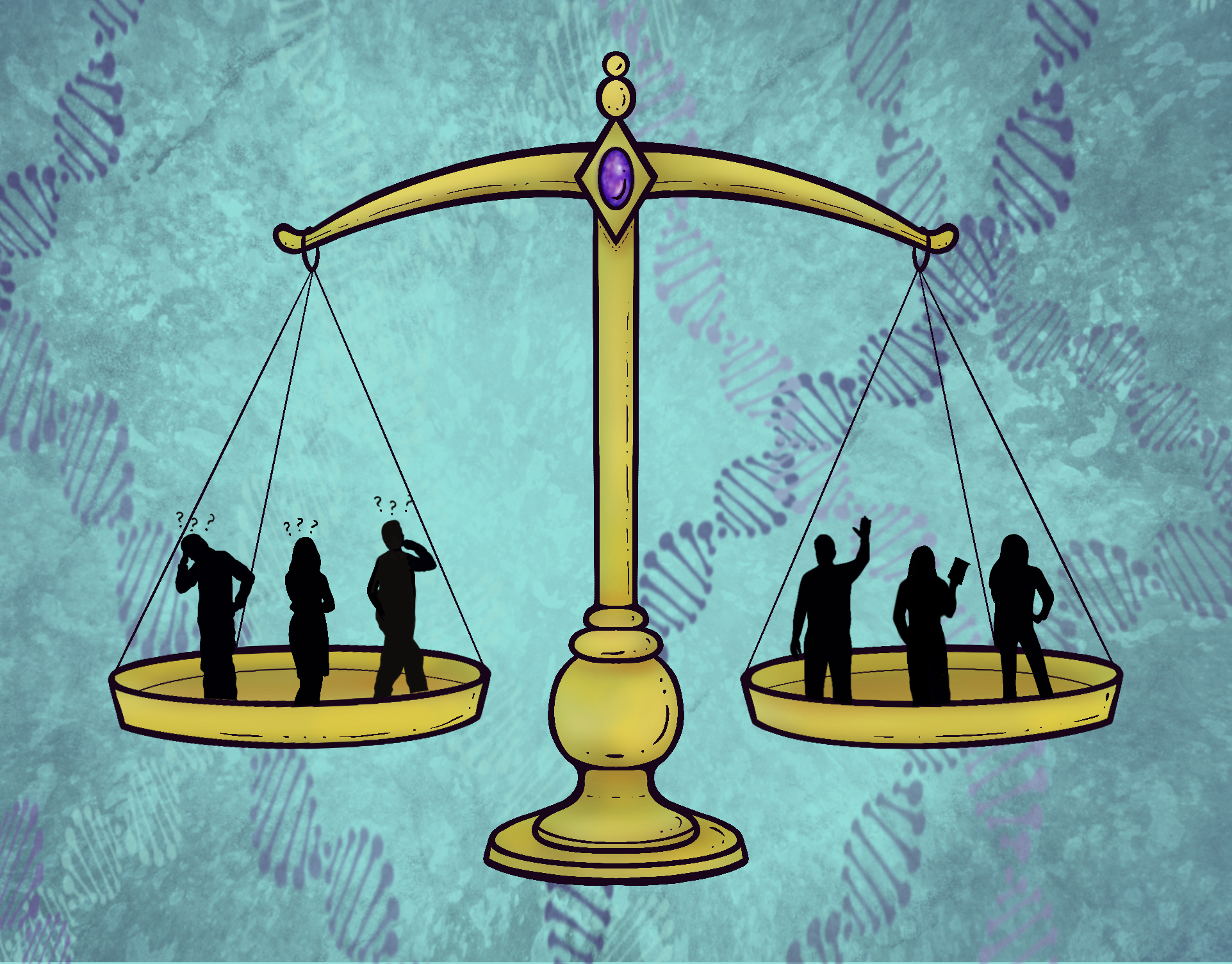Series Overview: Doctors usually turn to genetic testing to screen for health risks or spot diseases that are hard to diagnose, but the available education surrounding what these tests actually do is often bogged down with confusing scientific language that makes it difficult to understand. This is where Genetic Counselors (GC) come in to provide personalized assistance to both patients and their families. My name is Elizabeth and I have a Masters degree in Human Genetics & Genetic Counseling, which means that I spent 2.5 years after 4 years of college learning how to become a translator of the alphabet soup that is Genetics and explain it in a way that makes sense to everyone. If you are here reading this blog you may be dealing with some health complications that do not have a known cause, your doctor may have suggested genetic testing and/or counseling to learn more about your risk factors for disease or symptoms your body is showing, or you may just be curious about this type of testing in general. Ask a GC is a blog series that aims to empower patients (like you!) to know WHO to ask, WHAT to ask, WHEN to ask it, and WHERE to find answers about your Genetics questions and how they play into your healthcare journey. As a Genetic Counselor who has seen all types of genetic disease both professionally and personally, I aim to bring you this information with compassion and understanding as you navigate the interesting but sometimes overwhelming world of Genetics!
Please note: Though GenomicMD's Ask a GC series is written under the guidance of healthcare professionals and may refer to recent medical recommendations, it is not intended to be used as personalized medical advice. For medical evaluation or to develop a healthcare plan, please speak with your doctor or healthcare provider.
Ask a GC: Benefits & Limitations of Genetic Testing
Welcome to Ask a Genetic Counselor (GC) – an ongoing blog series by GenomicMD designed to help patients (like you!) feel more informed and empowered by genetic information, with the guidance of our GC. This blog post will dive into why someone may or may not consider doing their own genetic testing. Let’s get started!

What are the primary benefits of genetic testing?
Genetic testing may have benefits for many people, regardless of their specific results. This applies whether the results on the report are positive, negative, increased risk, or average risk for a gene mutation, variant, or condition. Genetic test results can provide a sense of relief from uncertainty and help people make informed decisions about managing their health care. For example: a negative result can eliminate the need for unnecessary checkups and screenings in some cases, whereas a positive result can direct a person toward available prevention, monitoring, and/or treatment options. Some genetic test results can also help people make decisions about how or whether to have children.
What are the primary risks and limitations of genetic testing?
I have spoken with many patients who are fearful of genetic testing because they are scared of HOW it is done. I have been asked whether it requires a sample of skin or bone or other parts of the body - and the answer is absolutely not! (Note: In very rare cases sometimes a teeny tiny piece of skin is used as a sample if there is an issue with doing it the regular way, but most patients say this is completely painless!) The physical risks associated with most genetic tests are very small, because usually they only require that you spit in a tube, or provide either a blood sample, or a “buccal swab” (a method that samples cells from the inside surface of the cheek - think crime shows!). I always tell patients that submitting the sample for genetic testing is the easy part.
Many of the risks associated with genetic testing actually involve the emotional, social, or financial consequences of the test results. This will not be the case for every patient or family, but sometimes thinking and talking about your family history and possible health risks for yourself or your close relatives can bring up negative emotions. While most patients I have worked with are doing genetic testing to be proactive and feel empowered about their health, there are definitely those that feel that this is like opening up a can of worms that they might not be ready to deal with now (or ever!). Any of these reactions are completely normal, understandable, and unique to the individual’s situation. For this reason, different people can react very differently; even within the same family.
Sometimes, genetic testing only provides limited information about an inherited condition. It is not a crystal ball, and cannot tell you your whole future. The test often cannot determine if a person will show symptoms of a disorder, how severe the symptoms will be, or whether the disorder will progress over time. What it CAN often do is give you a roadmap of what bumps in the road MIGHT happen and how to avoid those as best as possible.
A genetics professional can explain in detail the benefits, risks, and limitations of a particular test. It is important that any person who is considering genetic testing understand and weigh these factors before making a decision as to whether it is the right choice for them and their family.
What is genetic discrimination?
Genetic discrimination happens when people are treated differently by their place of employment and/or their insurance company because they have a genetic test result that causes or increases their risk of developing an inherited condition. This is a big concern for a lot of people going through genetic testing, and that is completely understandable! However, do not fear: several laws at the federal and state levels help protect people against genetic discrimination. In particular, a federal law called the Genetic Information Nondiscrimination Act (GINA) is designed to protect people from this form of discrimination.

GINA prohibits genetic discrimination in the United States as it applies to 2 specific categories. Title I of the law applies to health insurance while title II applies to employment. That being said, GINA and other laws do not protect people from genetic discrimination in every circumstance. For example, title II of GINA does not apply when an employer has fewer than 15 employees. If patients have specific questions about insurance coverage or genetic discrimination concerns, I often encourage them to consult with a trusted insurance agent. Ask a GC will also dive into more detail about GINA in a future post, but in the meantime, you can always visit GINAhelp.org for more information.
Thank you for joining me in reviewing some of the reasons why a person may or may not decide to have genetic testing. Most patients I meet with decide to pursue genetic testing and have a positive experience, but part of my job is recognizing that it is not the right choice or timing for everyone. Please keep your eye out for future blog content from Ask a GC for more information on genetic testing & counseling!
Blog Glossary:
Buccal Swab - A sample option for genetic testing that takes cells from the inside surface of the cheek with a tool that looks like a big Q-tip
Genetics Professional - Healthcare professionals with specialized degrees and experience in medical genetics and counseling, which can include geneticists and genetic counselors.
Genetic Discrimination - When people are treated differently by their employer or insurance company because they have a positive and/or high risk genetic test result.
GINA - the Genetic Information Nondiscrimination Act, a federal law designed to protect people from genetic discrimination